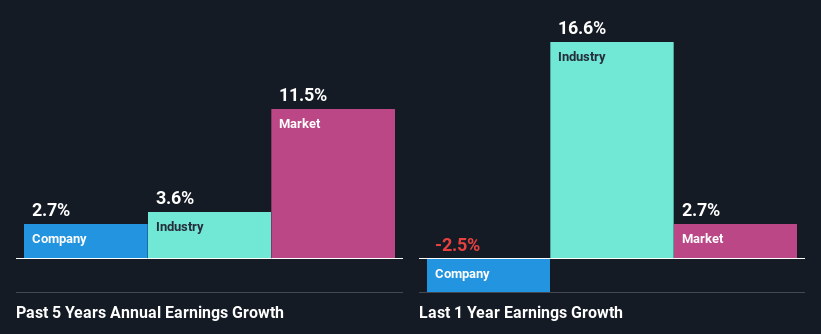- Germany
- /
- Personal Products
- /
- XTRA:BEI
Has Beiersdorf Aktiengesellschaft (ETR:BEI) Stock's Recent Performance Got Anything to Do With Its Financial Health?

Beiersdorf's (ETR:BEI) stock up by 8.4% over the past three months. We wonder if and what role the company's financials play in that price change as a company's long-term fundamentals usually dictate market outcomes. Specifically, we decided to study Beiersdorf's ROE in this article.
Return on equity or ROE is an important factor to be considered by a shareholder because it tells them how effectively their capital is being reinvested. In simpler terms, it measures the profitability of a company in relation to shareholder's equity.
See our latest analysis for Beiersdorf
How Do You Calculate Return On Equity?
Return on equity can be calculated by using the formula:
Return on Equity = Net Profit (from continuing operations) ÷ Shareholders' Equity
So, based on the above formula, the ROE for Beiersdorf is:
9.0% = €749m ÷ €8.3b (Based on the trailing twelve months to December 2023).
The 'return' is the profit over the last twelve months. That means that for every €1 worth of shareholders' equity, the company generated €0.09 in profit.
What Is The Relationship Between ROE And Earnings Growth?
Thus far, we have learned that ROE measures how efficiently a company is generating its profits. We now need to evaluate how much profit the company reinvests or "retains" for future growth which then gives us an idea about the growth potential of the company. Generally speaking, other things being equal, firms with a high return on equity and profit retention, have a higher growth rate than firms that don’t share these attributes.
Beiersdorf's Earnings Growth And 9.0% ROE
At first glance, Beiersdorf seems to have a decent ROE. Even when compared to the industry average of 11% the company's ROE looks quite decent. Despite the moderate return on equity, Beiersdorf has posted a net income growth of 2.7% over the past five years. A few likely reasons that could be keeping earnings growth low are - the company has a high payout ratio or the business has allocated capital poorly, for instance.
Next, on comparing with the industry net income growth, we found that Beiersdorf's reported growth was lower than the industry growth of 3.6% over the last few years, which is not something we like to see.

Earnings growth is an important metric to consider when valuing a stock. The investor should try to establish if the expected growth or decline in earnings, whichever the case may be, is priced in. This then helps them determine if the stock is placed for a bright or bleak future. One good indicator of expected earnings growth is the P/E ratio which determines the price the market is willing to pay for a stock based on its earnings prospects. So, you may want to check if Beiersdorf is trading on a high P/E or a low P/E, relative to its industry.
Is Beiersdorf Efficiently Re-investing Its Profits?
Beiersdorf's low three-year median payout ratio of 23% (or a retention ratio of 77%) should mean that the company is retaining most of its earnings to fuel its growth. This should be reflected in its earnings growth number, but that's not the case. So there might be other factors at play here which could potentially be hampering growth. For example, the business has faced some headwinds.
In addition, Beiersdorf has been paying dividends over a period of at least ten years suggesting that keeping up dividend payments is way more important to the management even if it comes at the cost of business growth. Based on the latest analysts' estimates, we found that the company's future payout ratio over the next three years is expected to hold steady at 21%. Regardless, the future ROE for Beiersdorf is predicted to rise to 12% despite there being not much change expected in its payout ratio.
Conclusion
On the whole, we do feel that Beiersdorf has some positive attributes. However, given the high ROE and high profit retention, we would expect the company to be delivering strong earnings growth, but that isn't the case here. This suggests that there might be some external threat to the business, that's hampering its growth. With that said, the latest industry analyst forecasts reveal that the company's earnings are expected to accelerate. To know more about the latest analysts predictions for the company, check out this visualization of analyst forecasts for the company.
Valuation is complex, but we're here to simplify it.
Discover if Beiersdorf might be undervalued or overvalued with our detailed analysis, featuring fair value estimates, potential risks, dividends, insider trades, and its financial condition.
Access Free AnalysisHave feedback on this article? Concerned about the content? Get in touch with us directly. Alternatively, email editorial-team (at) simplywallst.com.
This article by Simply Wall St is general in nature. We provide commentary based on historical data and analyst forecasts only using an unbiased methodology and our articles are not intended to be financial advice. It does not constitute a recommendation to buy or sell any stock, and does not take account of your objectives, or your financial situation. We aim to bring you long-term focused analysis driven by fundamental data. Note that our analysis may not factor in the latest price-sensitive company announcements or qualitative material. Simply Wall St has no position in any stocks mentioned.
About XTRA:BEI
Beiersdorf
Manufactures and distributes consumer goods in Europe, the Americas, Africa, Asia, and Australia.
Flawless balance sheet average dividend payer.


